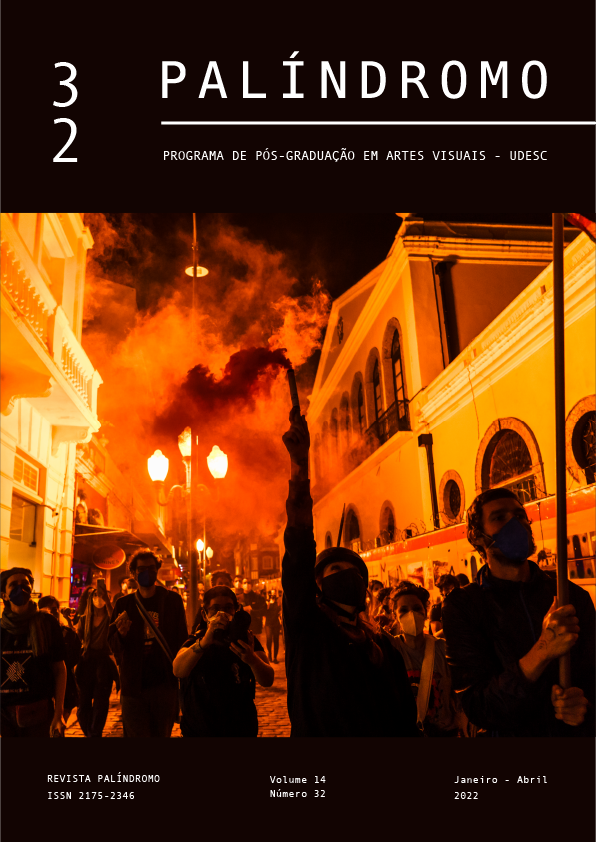About teachers’ formation and the role of classics in art classes: beauty can be everywhere
DOI:
https://doi.org/10.5965/2175234614322022084Keywords:
Art teaching, Teachers’ formation, ClassicsAbstract
This paper aims to discuss the idea of “classics” in Art teaching, from the complex perspective that put this concept either as the core of the educational processes, or either as a to-be-avoided conception. The objective is to put face-to-face different conceptions of the use of “classics” in the educational processes of Art, a main issue in the researches related to Art teachers’ formation that are conducted in the Observatório da Formação de Professores no âmbito do Ensino de Arte (OFPEA/BRARG). Bibliographic research was the chosen methodological path, going over both traditional and contemporary Art teaching authors. The idea is to better understand the criteria that define what undoubtedly is considered “Classic”, as paintings, compositions, romances, dramas, and how that conception is assumed by Art teachers. In particular it is intended to understand what defines the stability and resistance of certain Art works as “classics” (SAVIANI, 2013); or what defines art works as unforgettable through aspects that pass-through times and cultures (CALVINO, 2007)The results intend to highlight the mistakes on summarily repel the “classics” in Art teaching, with the damage of deny to the students the essential relations that they could build with Art through the “classics”.
Downloads
References
BARBOSA, João Alexandre. Introdução. In: GUINSBURG, Jacó (Org.). O classicismo. São Paulo: Perspectiva, 1997.
BARBOSA, Ana Mae. Arte-educação no Brasil. 3. ed. São Paulo, SP: Perspectiva, 1999.
BENDALA, Manuel. Saber ver a arte grega. São Paulo: Martins Fontes, 1989. (Coleção Saber ver a Arte).
BOURDIEU, Pierre; DARBEL, Alain. L’amour de l’art. Paris: Les Éditions de Minuit, 2003.
CALVINO, Ítalo. Por que ler os clássicos? São Paulo: Companhia da Letras, 2007.
CARVALHO, José Murilo. A formação das almas: o imaginário da República no Brasil. São Paulo: Companhia das Letras, 1990.
CSIKSZENTMIHALYI, Mihail. Creativity: Flow and the Psychology of discovery and invention (1st ed.). New York: HarperPerennial, 1997.
DUARTE, Newton. A contradição entre universalidade da cultura humana e o esvaziamento das relações sociais: por uma educação que supere a falsa escolha entre etnocentrismo ou relativismo cultural. In: Educação e Pesquisa. São Paulo, v. 32, n. 3, sept/dec. 2006. Disponível em: http://www.scielo.br. Acesso em: 10 jan. 2021. DOI: https://doi.org/10.1590/S1517-97022006000300012
FORQUIN, Jean-Claude. Escola e Cultura. Porto Alegre: Artes Médicas, 1993.
HOLLER, Marcos. Os jesuítas e a música no Brasil colonial. Campinas: Ed. da UNICAMP, 2010.
KLEIN, Ligia R. Proposta político-pedagógica para o Ensino Fundamental: Cadernos da Escola Guaicuru. Mato Grosso do Sul: Secretaria de Estado de Educação de Mato Grosso do Sul, 2000.
KLEIN, Ligia R. Alfabetização: quem tem medo de ensinar? 5. ed. São Paulo: Cortez; Campo Grande: Editora Universidade Federal do Mato Grosso do Sul, 2008.
KONDER, Leandro. Os marxistas e a arte: breve estudo histórico-crítico de algumas tendências da estética marxista. Rio de janeiro, RJ: Civilização Brasileira, 1966.
KOSIK, Karel. Dialética do concreto. Rio de Janeiro: Paz e Terra, 1976.
LEMINSKI, Paulo. Paulo Leminski: ensaios e anseios crípticos. Curitiba, PR: Inventa, 2014. (Coleção Gazeta do Povo: Literatura paranaense).
MALERBA, Jurandir. A corte no exílio: civilização e poder no Brasil às vésperas da Independência (1808 a 1821). São Paulo: Companhia das Letras, 2000.
MARX Karl., ENGELS, Friedrich. A ideologia alemã. 9. ed. São Paulo: Hucitec, 1993.
MARX, Karl. Manuscritos econômico-filosóficos. São Paulo: Boitempo, 2010.
MELO, Guilherme. A música no Brasil. Rio de Janeiro: Imprensa Nacional, 1947.
NAVES, Rodrigo. A forma difícil: ensaios sobre arte brasileira. 2.ed. São Paulo: Ática, 1997.
PAREYSON, Luigi. Os problemas da estética. São Paulo, SP: Martins Fontes, 1984.
PECHMAN, Robert Moses. Cidades estreitamente vigiadas. Rio de Janeiro: Casa da Palavra, 2002.
ROMANELLI, Guilherme. Antes de falar as crianças cantam! Considerações sobre o ensino de música na educação infantil. Revista Teoria e Prática da Educação, v. 17, n.3, 61-71, 2014.
SAVIANI, Dermeval. Pedagogia histórico-crítica: primeiras aproximações. 11. ed. Campinas, SP: Editores Associados, 2013.
SAVIANI, Dermeval. Educação: do senso comum à consciência filosófica. São Paulo: Autores Associados, 2009.
SCHLICHTA, Consuelo A. B. D. A pintura histórica e a elaboração de uma certidão visual para a nação no século XIX. Curitiba, 2006. Tese (Doutorado) – Universidade Federal do Paraná, Setor de Ciências Humanas, Letras e Artes,
Programa de Pós-Graduação do Departamento de História da UFPR.
SNYDERS, Georges. A alegria na escola. São Paulo, SP: Editora Manolo, 1988.
Downloads
Published
How to Cite
Issue
Section
License
Copyright (c) 2021 Guilherme Gabriel Ballande Romanelli, Consuelo Alcioni Borba Duarte Schlichta

This work is licensed under a Creative Commons Attribution 4.0 International License.
COPYRIGHT STATEMENT
The articles published by the magazine are free to use, intended for academic and non-commercial applications. Copyright is all assigned to the magazine. The articles whose authors are identified represent the expression from the point of view of their authors and not the official position of Palíndromo Magazine. The author (s) commits to whenever they publish material referring to the article published in Palíndromo mention this publication as follows:
This article was originally published by Palíndromo magazine in its volume (place the volume), number (place the number) in the year of (place the year) and can be accessed at: http://www.revistas.udesc.br/index.php/palindromo


